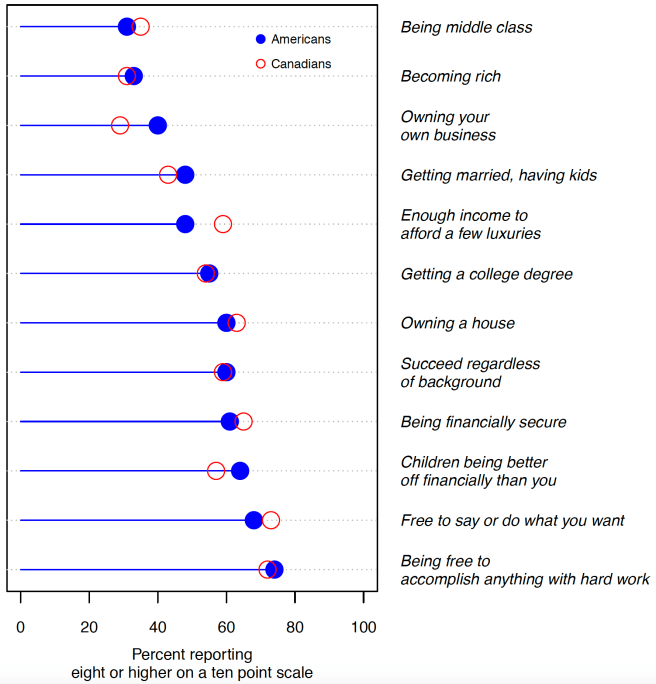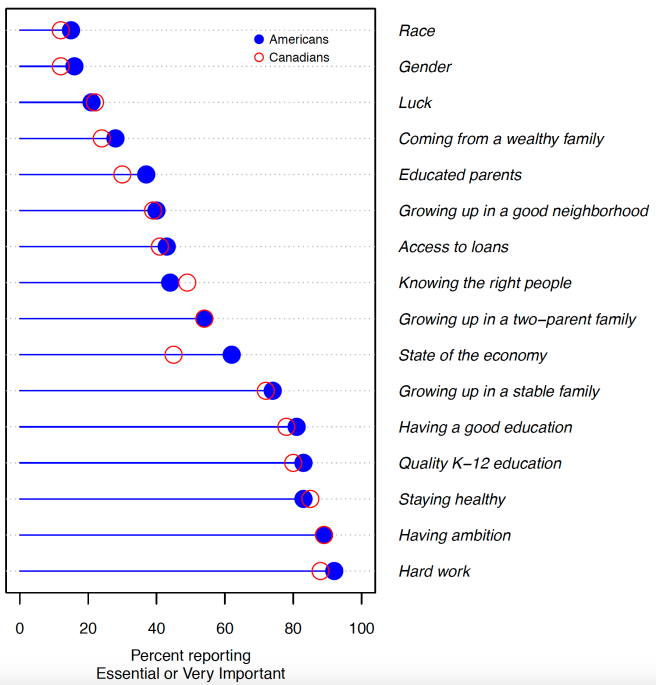Public opinion polls suggest that Canadians and Americans share basic attitudes toward inequality and opportunity, and toward the underlying drivers of upward mobility. If there is such a thing as the “Canadian Dream,” it would look very much like what Americans say is the “American Dream.”
The Pew Charitable Trusts conducted a number of public opinion polls asking Americans what meaning they attach to the phrase “The American Dream,” and these have been adapted and conducted in Canada with remarkably similar responses.
In these polls respondents were asked to indicate the degree to which they agreed with a series of possible definitions of the American Dream. Sixty percent of American respondents ranked “being able to succeed regardless of family background” eight or higher on a ten point scale, while 59 percent of Canadians did so. The percentage indicating that the statement “Your children being financially better off financially than you” represents the American Dream was 64 percent in the United States, and 57 percent in Canada.
These two options relate most directly to social mobility as measured by social scientists, and the country differences in responses to them are not statistically significant. In fact, this was the case for the ratings given to all but one of the other ten options presented to these representative samples, Americans ranking “Owning your own business” more highly.

Americans and Canadians also have similar views on the factors determining upward mobility, whether these deal with causes beyond an individual’s choice or responsibility—like race, gender, and luck—or to others under a person’s control. In both countries, factors associated with individual choice are viewed as the prime drivers of economic mobility.
Ninety-two percent of Americans and 88 percent of Canadians report that “hard work” was either essential or very important in determining upward mobility, and 89 percent in both countries felt this way about “having ambition.”

On the other hand, small minorities in both countries cited race, gender, or luck as being essential or very important, “luck” being the most cited with 21 percent of Americans and 22 percent of Canadians thinking of it in these terms. Indeed, the responses along a whole host of possible causes are very similar, if not identical.
But if Americans and Canadians hold a similar meaning of the good life, and similar views on how to obtain it, they have significantly different views on the role of collective action through public policy.
Other surveys show that while 35 percent of Americans “strongly agree” or “agree” with the statement “Government’s responsibility is to reduce the gap between high and low incomes,” a significantly larger proportion (47 percent) of Canadians have this view. This said, attitudes in these two countries are much more similar than in European countries, where the majority and often the strong majority feel redistribution is an important government responsibility.
The Pew-based research also suggests that Americans and Canadians share a preference for equality of opportunities over equality of outcomes: 71 percent of Americans and 68 percent of Canadians feel it was more important “to ensure everyone has a fair chance of improving their economic standing” than “to reduce inequality.” But the biggest difference in attitudes between citizens of these countries is that Canadians are much more likely to offer a more “activist” role for their governments.
When asked if government does more to help or more to hurt people trying to move up the economic ladder, respondents in both countries lacked strong proclivities. However, 46 percent of Canadians feel that government does more to help than to hurt, compared to 36 percent of Americans. … The difference in the responses to this question was among the largest of all questions asked. [ Corak (2010), page 17. ]
Cross-country differences in social mobility may be the result of a whole host of factors associated with public policies, and also with labor market inequality, and the structure and strength of families, but they also may simply reflect different social choices reflecting different values among the electorate. Since Canadians and Americans seem to define and value mobility in the same way, comparing them may help place a sharper focus on things that can be changed.
In other words, a Canada-US comparison might open up a wider menu of choices in American public debate than if the comparison was just over time within the country, or for that matter to European countries, which can be more easily dismissed as not relevant to American values.
[ This post is based upon my co-authored research paper with Marie Connolly and Catherine Haeck released by the National Bureau of Economic Research on April 15th, 2019 called “Intergenerational Mobility Between and Within Canada and the United States.” The paper is forthcoming in the Journal of Labor Economics, and the working paper version can be downloaded the from the NBER website, or downloaded as the ungated version here. ]
Read the other posts in this series:
Intergenerational mobility between and within Canada and the United States

there’s a typo here “Ninety-two percent of Americans and 88 percent of Americans report that “hard work” was either essential or very important in determining upward mobility, and 89 percent in both countries felt this way about “having ambition.” you said americans twice
Thank-you. I’ve made the correction.
Thanks for writing this. Using it as research for my senior thesis!
Good luck with it!